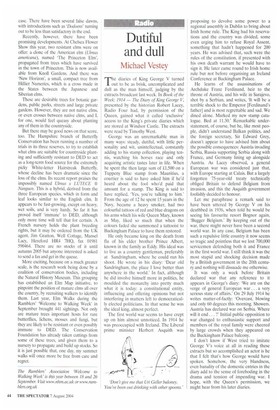Dutiful and dull
Michael Vestey
Mhe diaries of King George V turned out to be as brisk, uncomplicated and dull as the man himself, judging by the extracts broadcast last week. In Book of the Week: 1914 — The Diary of King George V, presented by the historian Robert Lacey, Radio Four had, by permission of the Queen, gained what it called 'exclusive' access to the King's private diaries which are stored at Windsor Castle. The extracts were read by Timothy West.
George was an unremarkable man in many ways: steady, dutiful, with little personality and wit, unintellectual, constantly adding to his stamp collection, playing tennis, watching his horses race and only acquiring artistic tastes later in life. When he spent the then large sum of £1,500 on a Tuppeny Blue stamp from Mauritius, a courtier is said to have asked him if he'd heard about the fool who'd paid that amount for a stamp. The King is said to have replied, 'Yes, you're talking to him.' From the age of 12 he spent 15 years in the Navy, became a heavy smoker, had two colourful tattoos of red and blue dragons on his arms which his wife Queen Mary, known as May, liked so much that when the colours faded she summoned a tattooist to Buckingham Palace to have them restored.
He only became king on the death from flu of his elder brother Prince Albert, known in the family as Eddy. His ideal was to live as a country gentleman, preferably at Sandringham, where he could run his shoot. He wrote in his diary: 'Dear old Sandringham, the place I love better than anywhere in the world.' In fact, although he did involve himself more in politics, he moulded the monarchy into pretty much what it is today: a constitutional entity, influencing and offering opinions but not interfering in matters left to democratically elected politicians. In that sense he was the ideal king, almost perfect.
The first world war seems to have crept up on him almost unnoticed. In 1914 he was preoccupied with Ireland. The Liberal prime minister Herbert Asquith was proposing to devolve some power to a regional assembly in Dublin to bring about Irish home rule, The King had his reservations and the country was divided, some even urging him to refuse Royal Assent, something that hadn't happened for 200 years. He was advised that, such were the rules of the constitution, if presented with his own death warrant he would have to sign it. He later came round to Irish home rule but not before organising an Ireland Conference at Buckingham Palace.
He learns of the assassinations of Archduke Franz Ferdinand, heir to the throne of Austria, and his wife in Sarajevo, shot by a Serbian, and writes, 'It will be a terrible shock to the Emperor [Ferdinand's father] and is most regrettable and sad. We dined alone. Marked my new stamp catalogue. Bed at 11.30.' Remarkable understatement, of course, but he, like most people, didn't understand Balkan politics, and the foreign secretary, Sir Edward Grey, doesn't appear to have advised him about the possible consequences: Austria invading Serbia, Russia supporting Serbia along with France, and Germany lining up alongside Austria. As Lacey observed, a general European war was considered just that, with Europe starting at Calais. But a largely forgotten 75-year-old treaty technically obliged Britain to defend Belgium from invasion, and this the Asquith government foolishly decided to honour.
Let me paraphrase a remark said to have been uttered by George V on his deathbed in 1936, when told he would be seeing his favourite resort Bognor again, 'Bugger Belgium.' By keeping out of the war, there might never have been a second world war. In any case, Belgium has been such a repulsive little country it now seems so tragic and pointless that we lost 700,000 servicemen defending both it and France in the first world war. I still think it was the most stupid and shocking decision made by a British government in the 20th century and nothing will dissuade me otherwise.
It was only a week before Britain declared war that any reference to it appears in George's diary: 'We are on the verge of general European war, ... a very serious state of affairs.' On 29 July 1914 he writes matter-of-factly: 'Overcast, blowing and only 60 degrees this morning. Showers. Austria has declared war on Serbia. Where will it end ... ?' Initial public opposition to war changed to enthusiastic support and members of the royal family were cheered by large crowds when they appeared on the Buckingham Palace balcony.
I don't know if West tried to imitate George V's voice at all in reading these extracts but so accomplished an actor is he that I felt that's how George would have spoken. Somehow, the very blandness, even banality of the domestic entries in the diary add to the sense of foreboding in the drama and tension of impending war. I hope, with the Queen's permission, we might hear from his later diaries.


























































 Previous page
Previous page